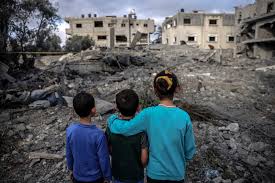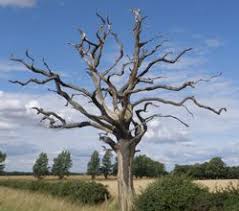by Sr. Constance Joanna Gefvert, SSJD
Isaiah 55.1-9, Ps 63.1-8
1 Corinthians 10.1-13, Luke 13.1-9

From Amnesty International
Every Friday the Dean of Divinity at Trinity, Chris Brittain, emails a reflection to students and faculty. I had almost finished my sermon when I read this reflection from him on Friday afternoon:
A spectre is haunting us: it is fear.” So writes Byung Chul-Han, a German-Korean philosopher, about the contemporary mood across the globe. Fear is a popular tool for rulers because it immobilizes and divides. In the current climate, we are even encouraged to fear thinking. This undermines the courage to think otherwise. To question. To imagine new possibilities. . .
It is into this present cultural mood that the common lectionary cycle points the church to the parable of the barren fig tree (Luke 13:1-9). . . . To those of us frustrated that our efforts, churches, or governments have not “born fruit” recently, may the message to the gardener in the parable, which is that it is not time to lose hope and cut down the barren tree, encourage us to continue to look for evidence of God’s work in the world. The promise is that what looks to be a mere barren tree may yet bear fruit.
His words offered me some hope, which I had not felt when I finished the first draft of this homily, and it gave me a different perspective. When we live in fear, we imagine the worst. When we live in hope we can imagine a different future, which can give us motive to act rather than be paralyzed.
These past two months we have seen the beginnings of what could be the fall of one of history’s great democracies. In fact, we have not just seen it – we are living through it, because this rapid decline has direct ramifications for the rest of the world. It affects our own political discourse, weakens our economy, and threatens our very sovereignty. It takes its personal toll on our emotional well-being as we watch the horrific scenes in the news about the suffering and decimation of innocent people and their lands. It increases our anger, frustration, and fear.
Where is God in all of this? I ask. How can such evil run rampant in a world that until a few years ago was edging toward greater and greater democracy and in our century seems to be racing toward destruction like Jesus’ description of the swine running to their death when he exorcised them from the madman?
There are personal tragedies too. What do we make of the suffering of those we know and love, whether illness, death, loss of job or a natural disaster? We are all aware of how close each of us lives to the edge, how our lives can suddenly change direction in a way we never anticipated and certainly never wanted.
In the gospel passage today, Jesus refers to two such events, now lost to history – one seems to be an act of terrorism, where Pilate massacred a group of Galilean pilgrims to Jerusalem. The other refers to some sort of natural disaster – the collapse of the Tower of Siloam – which might have been part of the temple precincts in Jerusalem. After describing each, Jesus says:
“Do you think that because these Galileans suffered in this way they were worse sinners than all other Galileans? No, I tell you; but unless you repent, you will all perish as they did.”
Jesus’ point here is that when people suffer and die, whether by natural causes or by human agency, it is not because they have sinned more than the rest of us. We who have escaped suffering for the moment should not be careless or glib. Unless we repent, Jesus says, we will perish – not because God is punishing us but because the life will go out of us, the love of God that has been planted in us and is meant to grow in us. Jesus is talking about two different kinds of “perishing” – one literal, one spiritual.
The greed that is dismantling the social safety net in the USA is spiritually not different from the greed in our own hearts. The cruelty exercised against the vulnerable is different only in degree from our own propensity to seek control and power. The desire for revenge over enemies has seeds in our own hearts. Jesus resisted these temptations – not only in his desert retreat but throughout his public life. We need to resist our own propensity to desire more and more that is not God, to seek control over others, and to carry grudges against those who have hurt us.
Terrorism, war, and other kinds of violence engineered through the current flurry of executive orders in the United States are committed by sinful people as well as by innocent victims who get drawn into the web of evil. And those of us who are fortunate enough to live in a place of relative peace, relatively unaffected by the worst of the natural disasters, cannot assume that our good fortune is due to our being such good people.
“Do you think that because these Galileans suffered in this way, they were worse sinners than all other Galileans? No, I tell you; but unless you repent, you will all perish as they did.”

The withered fig tree
The parable of the fig tree reinforces this point. The fig tree is given another chance to bear fruit before it is cut down. We have the opportunity to examine our inner thoughts and motives and to speak out against evil. Complacency can be the best fertilizer for the growth of evil.
And this brings us back to the passage from Isaiah, one of the most beautiful pieces of poetry in the Old Testament. God is calling us away from theological speculations about “why bad things happen to good people” and back to a deeper understanding of what it means to be human, to be loved and to love.
Ho, everyone who thirsts, come to the waters;
and you that have no money, come, buy and eat!
Come, buy wine and milk without money and without price.
What is it that we are thirst for? security? money? things? But in this passage the prophet is showing us that what we really thirst for is God. We thirst for God, we long for God. And we can have that relationship with God for free – wine and milk are symbols of this – no money required. All we need to do is repent – that is recognize our humanness, our propensity to sin, and respond to God’s love.
Seek the Lord while he may be found,
call upon him while he is near;
let the wicked forsake their way,
and the unrighteous their thoughts;
let them return to the Lord, that he may have mercy on them,
and to our God, who will abundantly pardon.
For my thoughts are not your thoughts,
nor are your ways my ways, says the Lord.
For as the heavens are higher than the earth,
so are my ways higher than your ways
and my thoughts than your thoughts.
God’s thoughts are just way above ours – we can’t account for natural disasters or cruelty or war. But we can trust God’s creation and ultimate purpose, and respond to God’s invitation to us to enter into a relationship of love.
As we come to the table to be fed with the body and blood of Christ, may we remember the promise of God:
For as the rain and the snow come down from heaven,
and do not return there until they have watered the earth,
making it bring forth and sprout,
giving seed to the sower and bread to the eater,
so shall my word be that goes out from my mouth;
it shall not return to me empty,
but it shall accomplish that which I purpose,
and succeed in the thing for which I sent it.
